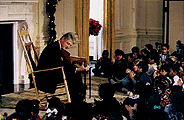|
 Behind
the scenes and events, the men and women who have lived in the Executive
Mansion have known the same happiness and frustration, pride and misery
that come to all of us. Behind
the scenes and events, the men and women who have lived in the Executive
Mansion have known the same happiness and frustration, pride and misery
that come to all of us.
Every night, the gruff and lonely warrior, Andrew Jackson, performed a
tender ritual. After removing the treasured miniature of his dead wife,
Rachel, which he carried
next to his heart, he would place it on the
bedside table near her worn and faded Bible, so that he might see her
face first on awakening in the morning.
In another of the family rooms, frail Eliza Johnson, devoted
wife of Andrew for 41
years, rocked and sewed as she awaited word of the Senate
vote at her husband's impeachment trial. "I knew he'd be acquitted," she
said firmly, but with tears in her eyes, to the official who brought
the good news. "I knew it."
 Fashionable President
Arthur, who lived luxuriously in the mansion during
his one term in the 1880's, showed another side of his nature when he was
alone. Like Jackson, he too was a recent widower and, like the earlier
President, Arthur carried on a ritual of remembrance by ordering fresh
flowers to be placed daily next to the photograph of his lovely Ellen.
Fashionable President
Arthur, who lived luxuriously in the mansion during
his one term in the 1880's, showed another side of his nature when he was
alone. Like Jackson, he too was a recent widower and, like the earlier
President, Arthur carried on a ritual of remembrance by ordering fresh
flowers to be placed daily next to the photograph of his lovely Ellen.
One of the most touching scenes in the history of the great change-overs
that have come to this house occurred in Eleanor Roosevelt's
study on
the second floor, after the death of her husband. Vice President Truman,
summoned to the White House, arrived without knowing of the massive
stroke that had ended the President's life at Warm Springs, Georgia. He
heard the news from Mrs. Roosevelt.
|

